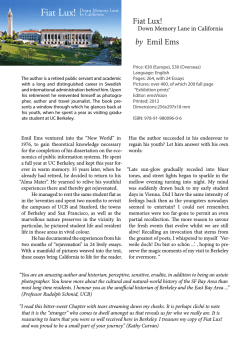
Spreadable Apps for Engagement in Digital Literacy UC Berkeley, UC Riverside
Spreadable Apps for Engagement in Digital Literacy UC Berkeley, UC Riverside Student engagement, sticky apps and zombies Juliette Levy, UC Riverside The online/hybrid classroom ecology online quizzes digital writing assignments graded with dynamic rubrics real time discussion boards: Piazza electronic peer evaluation with dynamic rubrics COURSE e-portfolios Dynamic content in lecture: Zaption voluntary comments - open questions: Twitter Shareable notes: Storify content delivered in lecture video Animation of lecture Videoscribe assignments engagement tools & apps There’s no one app for teaching well Zaption: active learning in an otherwise passive process The corollary of engagement is connection Zombies and engagement to upload assignments any UC campus 17 missions --last mission is the midterm exam/essay digitalzombies.ucr.edu Discovery and Synthesis Jen Dizio and John Scott, UC Berkeley Internet Memes- A Model for Engaging with Course Content? DISCOVERY: Artifacts circulate within communities of collaboration, curation, and creation. REMIX: “Open Texts” foster ongoing interaction and re-contextualization. SYNTHESIS: “Generative” content demands attention to the connections across artifacts. META-KNOWLEDGE: Focus on narrative and context prompts reflection and critical understanding. Threads Versus Ecosystems Refuse Versus Reuse THE SCROLL EFFECT: Vertical content organization becomes difficult to navigate. “Older Content” tends to lose value. STATIC CONTENT: Multimedia elements and texts are not open for repurposing or recontextualizing. VIEW AND REACT: Participation and collaboration is often limited to commenting and responding. Key Features of Collabosphere SPATIAL,VISUAL ORGANIZATION OF CONTENT: Thumbnails of artifacts making searching for engaging. TAGGING AND FILTERED SEARCH: Connects content across time and students. SOURCES traces artifacts back to original use. TIERED PRODUCTION ENVIRONMENT: Scaffolds student engagement with content while maintaining content modularity. INVITATIONS TO COLLABORATE: Easily facilitate synchronous group work on Media Cards and Narratives. Collabosphere in Context Pilot Research Studies ED 140AC: Berkeley undergraduate education course that focuses on sociocultural conceptions of literacy and language. MUSE & Norway: Collaboration between preservice teachers in graduate school in Berkeley and Norway. French Course: Berkeley undergraduate language course in French. A MEME EMERGED!! Future Directions: Integrations Instead of “pushing” students “out” of the Learning Management System, LTIs can “pull” students back “in.” MAINTAIN COHERENT ECOSYSTEM: This not only includes course content, but also student data. MINIMIZE AUTHENTICATIONS: Students do not need to create multiple usernames/passwords when accessing external apps, keeping student data secure. Curiosity and Validation Greg Niemeyer, UC Berkeley Top 5 Principles of Engagement 1. 2. 3. 4. 5. 6. Drama (Narrative and Ludic) Ownership (Material and Cultural) Transparency (Feedback & Metrics) Reputation (Personal and Collective) Separation (Temporal and Spatial) Scalability (Instance and Frequency) Engagement and Online Learning 1. Drama: p2p feedback means outcomes are uncertain and relevant. 2. Ownership: Amplify student experiences, leverage online experience as networked mirror 3. Transparency: Validate each action 4. Reputation: Share validation in leaderboard 5. Separation: Maintain course boundaries 6. Scalability: Connect course to life. Un-flipping the classroom builds context, and context builds relevance. 6. Plan Student Action Data Imagination Community 7. Application: Engagement Index: How does it feel? LTI intergration LTI Intergration Links and Resources Digital Zombies: digitalzombies.ucr.edu Collabosphere (Sandbox): https://collabosphere.berkeley.edu email: ucbguest@gmail.com password: 2014ClassDemo Engagement Index: http://www.uconline.edu Juliette Levy: juliette@ucr.edu Jen Dizio: jennifer@fortuitousfilms.com Greg Niemeyer: niemeyer@berkeley.edu John Scott: jmscott212@berkeley.edu
© Copyright 2025





















